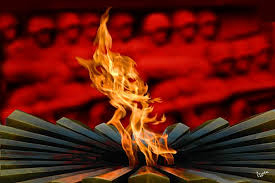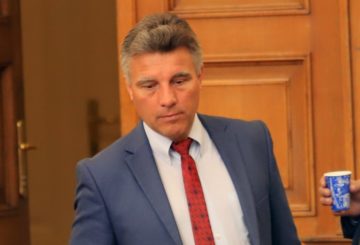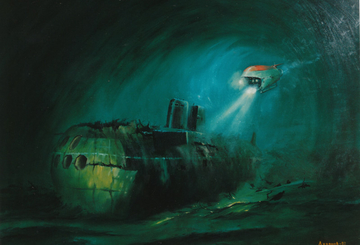Victory Day is a holiday that commemorates the victory of the Soviet Union over Nazi Germany in the Great Patriotic War. It was first inaugurated in the 16 republics of the Soviet Union, following the signing of the German Instrument of Surrender late in the evening on 8 May 1945 (after midnight, thus on 9 May Moscow Time). The Soviet government announced the victory early on 9 May after the signing ceremony in Berlin. Though the official inauguration occurred in 1945 the holiday became a non-labour day only in 1965 and only in certain Soviet republics.
In East Germany, 8 May was observed as “Liberation Day” from 1950 to 1966, and was celebrated again on the 40th anniversary in 1985. In 1975, a Soviet-style “Victory Day” was celebrated on 9 May. Since 2002, the German state of Mecklenburg-Vorpommern has observed a commemoration day known as the “Day of Liberation from National Socialism, and the End of the Second World War”.
After regaining their independence from the Soviet Union, the Baltic countries now commemorate the end of World War II on 8 May, the Victory in Europe Day.
History
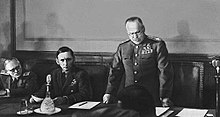 Marshal Zhukov reading the German capitulation. Seated on his right is Air Chief Marshal Arthur Tedder.
Marshal Zhukov reading the German capitulation. Seated on his right is Air Chief Marshal Arthur Tedder.
 Field-Marshal Keitel signing the ratified surrender terms for the German military
Field-Marshal Keitel signing the ratified surrender terms for the German military
Two separate events of the capitulation of Nazi Germany took place at the time. First, the capitulation to the Allied nations in Reims was signed on 7 May 1945, effective 23:01 CET 8 May. This date is commonly referred to as the V-E Day (Victory in Europe Day) in most western European countries. Joseph Stalin was displeased by this, believing that the German surrender should have been accepted only by the envoy of the USSR Supreme command and signed only in Berlin. Stalin insisted the Reims protocol be considered preliminary, with the main ceremony to be held in Berlin, where Marshal Zhukov was at the time, as the latter recounts in his memoirs:
| “ | [Quoting Stalin:] Today, in Reims, Germans signed the preliminary act on an unconditional surrender. The main contribution, however, was done by Soviet people and not by the Allies, therefore the capitulation must be signed in front of the Supreme Command of all countries of the anti-Hitler coalition, and not only in front of the Supreme Command of Allied Forces. Moreover, I disagree that the surrender was not signed in Berlin, which was the center of Nazi aggression. We agreed with the Allies to consider the Reims protocol as preliminary. | ” |
Therefore, another ceremony was organized in a surviving manor in the outskirts of Berlin late on 8 May, when it was already 9 May in Moscow due to the difference in time zones. Field-Marshal Wilhelm Keitel submitted the German Instrument of Surrender to Marshal Georgy Zhukov in the Soviet Army headquarters in Berlin-Karlshorst. To commemorate the victory in the war, the ceremonial Moscow Victory Parade was held in the Soviet capital on 24 June 1945.
The other World War II victory day, the V-J day (Victory in Japan Day) is commemorated in August.
Celebration
During the Soviet Union’s existence, 9 May was celebrated throughout the USSR and in the countries of the Eastern Bloc. Though the holiday was introduced in many Soviet republics between 1946 and 1950, it only became a non-labour day in the Ukrainian SSR in 1963 and the Russian SSR in 1965. In the Russian SSR a weekday off (usually a Monday) was given if 9 May fell on a Saturday or Sunday.
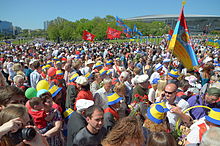 Victory Day 2013 in Donetsk, Ukraine
Victory Day 2013 in Donetsk, Ukraine
The celebration of Victory Day continued during subsequent years. The war became a topic of great importance in cinema, literature, history lessons at school, the mass media, and the arts. The ritual of the celebration gradually obtained a distinctive character with a number of similar elements: ceremonial meetings, speeches, lectures, receptions and fireworks.
In Russia during the 1990s, the 9 May holiday was not celebrated with large Soviet-style mass demonstrations due to the policies of successive Russian governments. Following Vladimir Putin‘s rise to power, the Russian government began promoting the prestige of the governing regime and history, and national holidays and commemorations became a source of national self-esteem. Victory Day in Russia has increasingly become a celebration in which popular culture plays a central role. The 60th and 70th anniversaries of Victory Day in Russia (2005 and 2015) became the largest popular holidays since the collapse of the Soviet Union.
In 2015 around 30 leaders, including those of China and India, attended the 2015 celebration, while Western leaders boycotted the ceremonies because of the Russian military intervention in Ukraine.
Countries celebrating 9th of May
| This section needs additional citations for verification. Please help improve this article by adding citations to reliable sources. Unsourced material may be challenged and removed. (May 2017) (Learn how and when to remove this template message) |
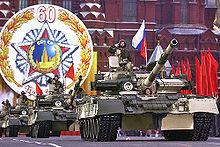 2005 Victory Day parade on Moscow‘s Red Square.
2005 Victory Day parade on Moscow‘s Red Square.
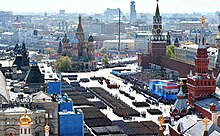 2015 Victory Day paradeon Moscow‘s Red Square.
2015 Victory Day paradeon Moscow‘s Red Square.
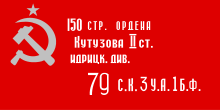 “Victory Banner#5″, raised on the roof of the Reichstag building
“Victory Banner#5″, raised on the roof of the Reichstag building
-
 Armenia has officially recognised 9 May since its independence in 1990. The holiday was similarly celebrated there while the country was part of the Soviet Union.
Armenia has officially recognised 9 May since its independence in 1990. The holiday was similarly celebrated there while the country was part of the Soviet Union. -
 Azerbaijan has officially recognised 9 May since its independence in 1991. The holiday was similarly celebrated there while the country was part of the Soviet Union.
Azerbaijan has officially recognised 9 May since its independence in 1991. The holiday was similarly celebrated there while the country was part of the Soviet Union. -
 Belarus has officially recognised 9 May since its independence in 1991 and considers it a non-working day. The holiday was similarly celebrated there while the country was part of the Soviet Union. Belarus has had 2 Victory Day Parades on Masherov Avenue (2010 and 2015) and has had an annual ceremony on Victory Square since independence.
Belarus has officially recognised 9 May since its independence in 1991 and considers it a non-working day. The holiday was similarly celebrated there while the country was part of the Soviet Union. Belarus has had 2 Victory Day Parades on Masherov Avenue (2010 and 2015) and has had an annual ceremony on Victory Square since independence. -
 Bosnia and Herzegovina has officially recognised 9 May since its independence. However, it is not a working day only in Republic of Srpska.
Bosnia and Herzegovina has officially recognised 9 May since its independence. However, it is not a working day only in Republic of Srpska. -
 Georgia has officially recognised 9 May since its independence in 1991. The holiday was similarly celebrated there while the country was part of the Soviet Union.
Georgia has officially recognised 9 May since its independence in 1991. The holiday was similarly celebrated there while the country was part of the Soviet Union. -
 German Democratic Republic recognised Tag der Befreiung (Day of liberation) on 8 May, it was celebrated as a public holiday from 1950 to 1966, and on the 40th anniversary in 1985. Only in 1975 the official holiday was 9 May instead and that year called Tag des Sieges (Victory Day).
German Democratic Republic recognised Tag der Befreiung (Day of liberation) on 8 May, it was celebrated as a public holiday from 1950 to 1966, and on the 40th anniversary in 1985. Only in 1975 the official holiday was 9 May instead and that year called Tag des Sieges (Victory Day). -
 Federal Republic of Germany does not officially recognise 9 May as a holiday. However, informal celebrations continue to take place in some areas of the former German Democratic Republic. Also, on 8 May, the German state of Mecklenburg-Vorpommern since 2002 has recognised a commemorative day Tag der Befreiung vom Nationalsozialismus und der Beendigung des 2. Weltkrieges (Day of Liberation from National Socialism, and the End of the Second World War).
Federal Republic of Germany does not officially recognise 9 May as a holiday. However, informal celebrations continue to take place in some areas of the former German Democratic Republic. Also, on 8 May, the German state of Mecklenburg-Vorpommern since 2002 has recognised a commemorative day Tag der Befreiung vom Nationalsozialismus und der Beendigung des 2. Weltkrieges (Day of Liberation from National Socialism, and the End of the Second World War).
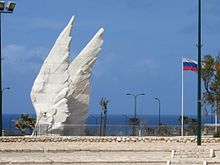 Victory Monument in Netanya, Israel
Victory Monument in Netanya, Israel
-
 Israel officially designates the Victory Day on the 9 May as a national remembrance day. Schools and shops however carry on business as usual and it is not a holiday. As a result of immigration of many Red Army veterans, Israel now hosts the largest and most extensive Victory Day celebrations outside the former Soviet Union.[11] Traditions and customs of Victory Day are the same as in Russia, with marches of Immortal Regiments held in cities with large populations of Red Army veterans and their descendants.
Israel officially designates the Victory Day on the 9 May as a national remembrance day. Schools and shops however carry on business as usual and it is not a holiday. As a result of immigration of many Red Army veterans, Israel now hosts the largest and most extensive Victory Day celebrations outside the former Soviet Union.[11] Traditions and customs of Victory Day are the same as in Russia, with marches of Immortal Regiments held in cities with large populations of Red Army veterans and their descendants. -
 Kazakhstan has officially recognised 9 May since its independence in 1991. It’s a non-working day. The holiday is sometimes celebrated in connection with other national holiday on 7 May (Defender of the Fatherland Day). From 1947 the holiday was similarly celebrated there while the country was part of the Soviet Union.
Kazakhstan has officially recognised 9 May since its independence in 1991. It’s a non-working day. The holiday is sometimes celebrated in connection with other national holiday on 7 May (Defender of the Fatherland Day). From 1947 the holiday was similarly celebrated there while the country was part of the Soviet Union. -
 Kyrgyzstan has officially recognised 9 May since its independence in 1991. The holiday was similarly celebrated there while the country was part of the Soviet Union.
Kyrgyzstan has officially recognised 9 May since its independence in 1991. The holiday was similarly celebrated there while the country was part of the Soviet Union. -
 Moldova has officially recognised 9 May since its independence in 1990. From 1951 the holiday was similarly celebrated there while the country was part of the Soviet Union.
Moldova has officially recognised 9 May since its independence in 1990. From 1951 the holiday was similarly celebrated there while the country was part of the Soviet Union. -
 Montenegro officially recognised 9 May as the Victory Day over Fascism as an official holiday.
Montenegro officially recognised 9 May as the Victory Day over Fascism as an official holiday. -
 Poland officially recognised 9 May from 1945 until 2014. From 24 April 2015 Poland officially recognised 8 May as “Narodowy Dzień Zwycięstwa” – “National Victory Day”.
Poland officially recognised 9 May from 1945 until 2014. From 24 April 2015 Poland officially recognised 8 May as “Narodowy Dzień Zwycięstwa” – “National Victory Day”. -
 Russian Federation has officially recognised 9 May since its formation in 1991 and considers it a non-working day even if it falls on a weekend (in which case any following Monday will be non-working); The holiday was similarly celebrated there while the country was part of the Soviet Union.
Russian Federation has officially recognised 9 May since its formation in 1991 and considers it a non-working day even if it falls on a weekend (in which case any following Monday will be non-working); The holiday was similarly celebrated there while the country was part of the Soviet Union. -
 Serbia celebrates 9 May as the Victory Day over Fascism but it’s a working holiday. Still many people gather to mark the anniversary with the war veterans, including Serbian army, Minister of Defense and the President.
Serbia celebrates 9 May as the Victory Day over Fascism but it’s a working holiday. Still many people gather to mark the anniversary with the war veterans, including Serbian army, Minister of Defense and the President. -
 Soviet Union officially recognised 9 May from 1946 until its dissolution in 1991. It became a non-labour holiday in 1965.
Soviet Union officially recognised 9 May from 1946 until its dissolution in 1991. It became a non-labour holiday in 1965. -
 Tajikistan has officially recognised 9 May since its independence following the dissolution of the Soviet Union. The holiday was similarly celebrated there while the country was part of the Soviet Union.
Tajikistan has officially recognised 9 May since its independence following the dissolution of the Soviet Union. The holiday was similarly celebrated there while the country was part of the Soviet Union. -
 Turkmenistan has officially recognised 9 May since its independence in 1991. The holiday was similarly celebrated there while the country was part of the Soviet Union.
Turkmenistan has officially recognised 9 May since its independence in 1991. The holiday was similarly celebrated there while the country was part of the Soviet Union. -
 Ukraine officially recognised 9 May from its independence in 1991 until 2013, where it was a non-working day. If it fell on a weekend the following Monday was non-working. The holiday was similarly celebrated there while the country was part of the Soviet Union. As of 2015, Ukraine officially celebrates Victory Day over Nazism in World War II on May 9, per a decree of parliament. Additionally the term “Great Patriotic War” as a reference was replaced with “Second World War” in all Ukrainian legislation. Since 15 May 2015 Communist and Nazi symbols are prohibited in Ukraine.
Ukraine officially recognised 9 May from its independence in 1991 until 2013, where it was a non-working day. If it fell on a weekend the following Monday was non-working. The holiday was similarly celebrated there while the country was part of the Soviet Union. As of 2015, Ukraine officially celebrates Victory Day over Nazism in World War II on May 9, per a decree of parliament. Additionally the term “Great Patriotic War” as a reference was replaced with “Second World War” in all Ukrainian legislation. Since 15 May 2015 Communist and Nazi symbols are prohibited in Ukraine. -
 Uzbekistan has officially recognised 9 May from 1999, where the holiday was introduced as “Memorial/Remembrance Day”. The holiday was also celebrated there while the country was part of the Soviet Union.
Uzbekistan has officially recognised 9 May from 1999, where the holiday was introduced as “Memorial/Remembrance Day”. The holiday was also celebrated there while the country was part of the Soviet Union.


